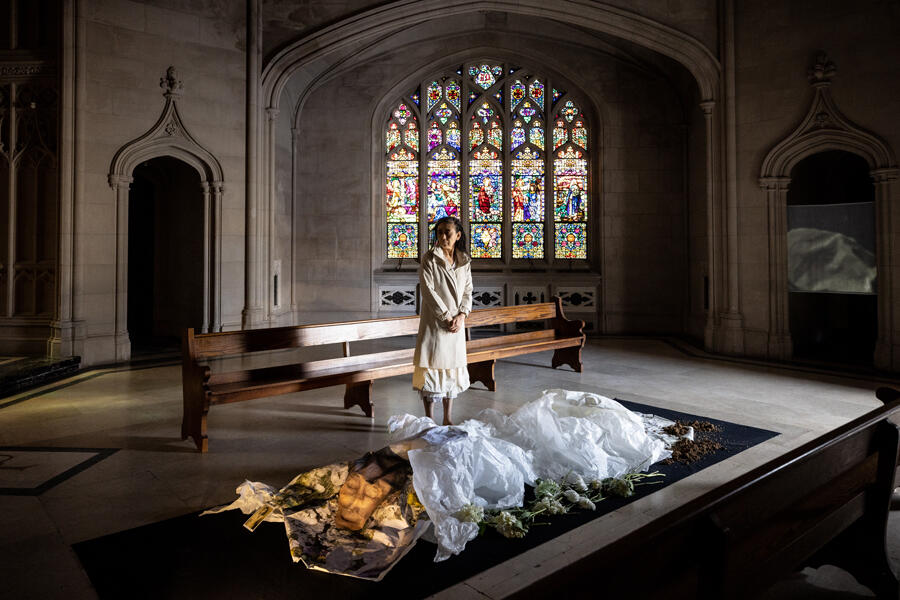What to See in the US Right Now
From Eiko Otake’s installation at Green-Wood Cemetery, New York, to a group show at Honor Fraser, Los Angeles, these are the must-see shows
From Eiko Otake’s installation at Green-Wood Cemetery, New York, to a group show at Honor Fraser, Los Angeles, these are the must-see shows

Eiko Otake
Green-Wood Cemetery, New York
25 February – 7 May

Time seems to accumulate indefinitely in the works of dancer and choreographer Eiko Otake. For nearly 50 years, Eiko – she goes by her first name – has addressed the imprinting of death and trauma on the body through collective memory, often with longtime collaborator Takashi Koma Otake. Her explorations of loss have included practicing her own death, talking with the dead and moving through sites of remembrance with actions that evoke the slow intensity of butoh (Japanese dance theatre) and the emotional urgency of a funeral. – Mariana Fernández
‘Make Me Feel Mighty Real: Drag/ Tech and the Queer Avatar’
Honor Fraser, Los Angeles
3 March – 27 May

From the aberrant splotches of 1970s screenprints to incandescent virtual worlds built by contemporary artists, ‘Make Me Feel Mighty Real: Drag/Tech and the Queer Avatar’ at Honor Fraser tracks how the tactics of queer creation – to ghost, glitch, infiltrate, speculate – move across time and technology to serve as scaffolding for much of today’s art practice. By framing drag itself as a kind of technology – an encrypted intelligence archived and activated across generations and cultures – the exhibition hones in on the role of the avatar in queer world-making. Understood both as otherworldly manifestation and, in more recent years, as digital surrogate for online interactions, the avatar becomes a prismatic interlocutor among the dazzling array of more than 40 artists on show. – Alice Bucknell
Ignacio Gatica
von ammon co, Washington, D.C.
25 March – 7 May

From 1973 to 1990, the dictator Augusto Pinochet ruled Chile with an iron fist. It was a forced experiment in neoliberalism, led by a generation of young economists educated in free-market theories at the University of Chicago and other US institutions – a reshaping of which American right-wingers could only dream. As multimedia sculptor Ignacio Gatica told me, while tinkering with a circuit board in the gallery, ‘Santiago is like a mini-Manhattan’: an eerily distorted mirror image in which its worst lessons – consumerism, debt, financialization of daily life – are gospel.
Such conversations were at the heart of the Washington, D.C., protests of 2000 against IMF/World Bank policies that led to the immiseration of millions in the Global South, rationalized by bureaucrats as ‘structural adjustment’ – the cost of doing business. Gatica’s Preface to an Automated Stratosphere (2022) visualizes such abstraction: propped against the wall, an LED ticker of the sort you’d see in Times Square, New York, cascades data like water, a lovely cyber-punk minimalism. But it’s no mere readymade. Per Gatica, such devices are difficult to come by, so he builds his own from aluminium and steel, assembling arrays of circuits to light the display. Its algorithm, which simulates a roll call of debt by country and as a percentage of GDP – Kazakhstan, for instance, clocked an eye-popping 99.6 percent – is Gatica’s work as well. – Ian Bourland
‘Tell Me What You Remember’
Barnes Foundation, Philadelphia
5 March - 21 May

The Apartheid regime that governed South Africa for much of the 20th century operated through separateness: Black people were moved to the hinterlands, men taken from families, cosmopolitan neighbourhoods bulldozed, languages disrupted. Lebohang Kganye and Sue Williamson’s exhibition at the Barnes Foundation, steeped in such histories, sounds these dislocations and undertakes an act of restoration. This is fitting: for all of the press that the men of the anti-Apartheid struggle received, it was women who held communities together and, often, bravely resisted. - Ian Bourland
Main image: Ebony G. Patterson, below... (detail), 2021, mixed media on jacquard woven photo tapestry and custom vinyl wallpaper, 2.6 × 1.5 m. Courtesy: the artist






















